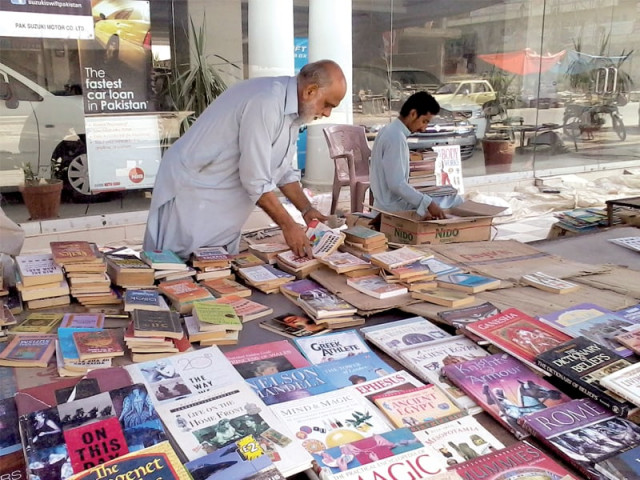Saddar book bazaar — a reader’s paradise that is losing readers
With decreasing readership, stall owners struggle to make ends meet.

Saddar book bazaar — a reader’s paradise that is losing readers
There, he and his four employees set up small tables on the footpath outside a car dealership, fix poles on the roads and tie a tarp to the poles to cover the tables. They then take out some 2,000 books from the cartons and arrange them on the tables. The entire process takes around three hours.
Haq and his workers are not the only sellers here. Other booksellers too set up shops on the footpaths in Saddar every Sunday to sell new as well as used books.
“The bazaar was started in the 60s by the Siddiqui brothers, who currently own 70% of old book shops in the twin cities,” says Haq, who sells English books and magazines at his stall.
“The English reader is willing to pay,” he explains. “Moreover, the English books, from literature to philosophy, are easily available in the wholesale market.”
The people who visit the bazaar are diverse — students, professionals and reading enthusiasts are just some of those who buy books from the market.
These days, however, the students visiting the stalls have decreased in number. “These days they usually come [just] to buy textbooks.”
Used and low-priced editions of engineering and medical textbooks are in high demand at the book bazaar. An original hardcover of these books can cost around Rs1,000 at a bookstore, but the used books are between Rs400 and Rs500.
Muhammad Ali, a computer software student at Army Public College of Management and Sciences, is about to leave one of the stalls with two calculus books tucked under his arm. His visit to the market was “satisfactory”, he says.
The market operates under the patronage of the Rawalpindi Cantonment Board (RCB), which charges Rs300 from each stall owner every Sunday. In addition, the booksellers also have to reach an agreement with traders to set up stalls in front of their shops.
Sohail Ahmed, another vendor who runs a bookshop in Westridge, complains that the RCB has increased the charges from Rs30 to Rs300 in the past two years. “Sometimes, we don’t make enough sales. It would be nice if the board reduces the fee to Rs150.”
Haq says he has to earn around Rs5,000 every Sunday to break even. His expenditures involve paying his workers, transportation, equipment costs, and the RCB’s fee. Though he is able to make do on most days, the dwindling stream of readers is jeopardising the ventures of some stall owners.
Ahmed, too, believes that the number of people buying books has decreased over time, due to the internet and CDs.
As one walks by, a few families with young children can be seen — an encouraging sign for a nation suffering from poor literacy rate.
“I bring my children here so they can develop an interest in books. They easily relate with books that have the same cartoons they watch on the television,” says Major Kashif Safdar, who has brought his three sons, all of primary school age, to check out books at Haq’s stall.
Nearby, Kamran Javed, a schoolteacher, is browsing through books on politics and history. “I tell my students to visit this market. Sometimes, they come back and tell me about the books they buy.”
While English books dominate this market, Urdu books are not completely non-existent.
Around the corner of Bank Road sits Amjad Kamal, surrounded by several hundred Urdu books — mostly novels and Islamic texts.
Kamal, who works at a government department in Islamabad on weekdays, says his customers are usually middle-aged people, mostly women who buy novels by Bano Qudsia and Umaira Ahmed. He complains that the wholesalers have doubled book prices, which cuts into his profits. “Customer bargaining has increased and our profit margins have reduced.”
Back at Haq’s stall, workers can be heard bargaining with a customer. “You won’t find this for Rs400 even in Karachi.”
Karachi is the hub of old books trade, says Haq. Most of the used books reach Pakistan and other third world countries after they are trashed by libraries in the West. Some of them find their way to Pakistan’s main port city from cheap printing presses in China and the Far East. Apart from that, old books sold by readers are another supply source for the Sunday bazaar.
As the day draws to a close, and before he and his team spend another two hours disassembling the stall, Haq has a suggestion for the officials. “The RCB and CDA in Islamabad should allot space for book markets. They will be doing a service to society.”
Published in The Express Tribune, September 24th, 2012.



















COMMENTS
Comments are moderated and generally will be posted if they are on-topic and not abusive.
For more information, please see our Comments FAQ